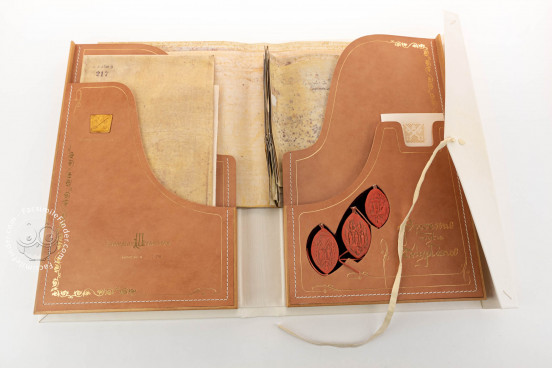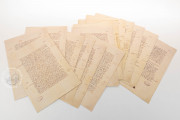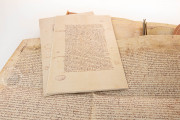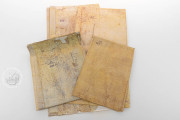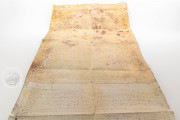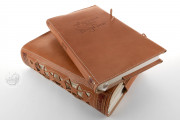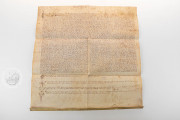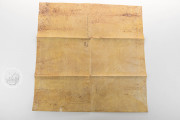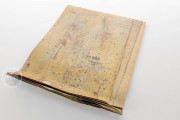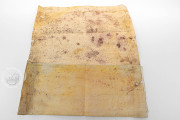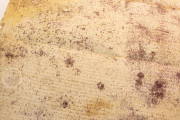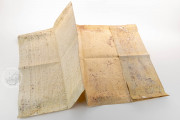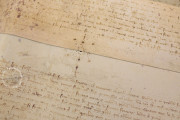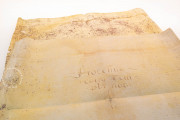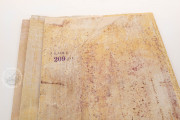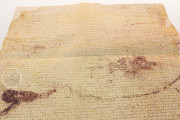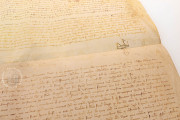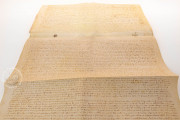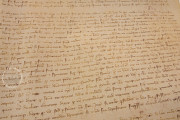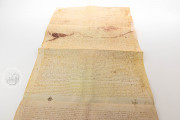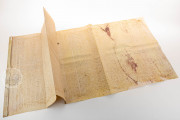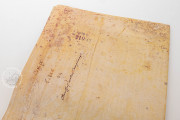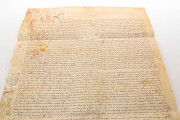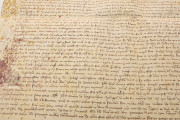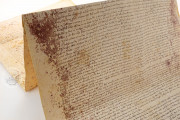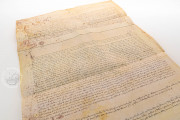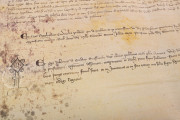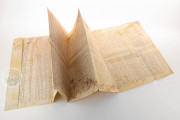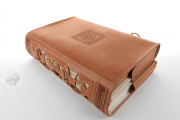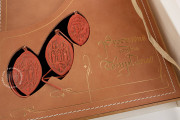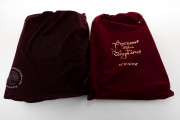The Trial against the Templars collection comprises transcriptions of testimony concerning accusations of heresy against French knights of the Christian military religious order of the Poor Knights of Christ and the Temple of Solomon. The collection includes four large-scale parchment documents prepared at (or from proceedings conducted at) Poitiers and Chinon in 1308 and twenty-four loose paper leaves made in 1312 at the papal chancery at the order of Pope Clement V. The documents provide unique insight into the events that led to the suppression of the order in 1312.
Founded in 1118 to protect pilgrims in the Holy Land, the Templars soon became a military order serving the King of Jerusalem. By the early fourteenth century, the order had become very wealthy, and—probably hoping to seize some of that wealth—Philip IV (1268-1314), King of France, had ugly rumors spread about the knights that led to arrests and an inquiry into their activities.
Struggle between King and Pope
The trial of the Templars was a part of a long diplomatic struggle between the French king, Philip IV, "the Fair," and the papacy that began before Clement V's reign. Philip had all Knights Templar in French territory arrested in 1307 and tried for heresy. Many confessed under torture or the threat of torture. The pope then launched an inquiry into the whole affair.
Testimony before the Pope
The pope insisted that the knights testify in his presence rather than before any secular authority or the inquisition. Three parchment documents (of an original four) describe testimony given by seventy-two knights before Pope Clement V (d. 1314) and assembled cardinals at the pope's temporary residence at Poitiers in central France from June 29 to July 2, 1308 (A.A. Arm.D. 208, 209, and 210). One notary drew up each document, and another checked its veracity.
Testimony at the Château of Chinon
Many of the order's highest-ranking leaders—including the Grand Master, Jacques de Molay (d. 1314)—were held at the royal castle at Chinon, a ploy that excluded them from the proceedings at Poitiers, as Philip intended. The pope, however, had those knights deposed in August at Chinon before a commission of three cardinals.
The document recording those proceedings (A.A. Arm.D 217) was effectively lost until it was rediscovered in 2001. Ultimately, Clement considered the testimony at Chinon as part of his later judgment of the order. As with the documents concerning the depositions at Poitiers, one notary drew up the document, and another verified its accuracy.
Summary and Index
The Registrum Avenionense ("Avignon Register") contains summaries of papal proceedings from the fourteenth and early fifteenth centuries. Folios 437-460 are twenty-four loose leaves that constitute a summary of the testimony heard at Poitiers and Chinon and an extensive index. The summary is especially valuable because it offers a glimpse into the testimony described on the lost fourth parchment document recording the minutes of the proceedings at Poitiers. It also includes marginal notes made by the pope.
The End of the Order
In 1312, Clement dissolved the order at the Council of Vienne, transferring all the Templars' property to the Hospital of Saint John of Jerusalem. He did not condemn the order as guilty of heresy, but he banned anyone from entering the order on the threat of excommunication. Two leaders, the Grand Master and the Grand Commander of Normandy, both of whom protested their imprisonment, were condemned to death.
We have 1 facsimile edition of the manuscript "Trial against the Templars (Collection)": Processus Contra Templarios facsimile edition, published by Scrinium, 2007
Request Info / Price
